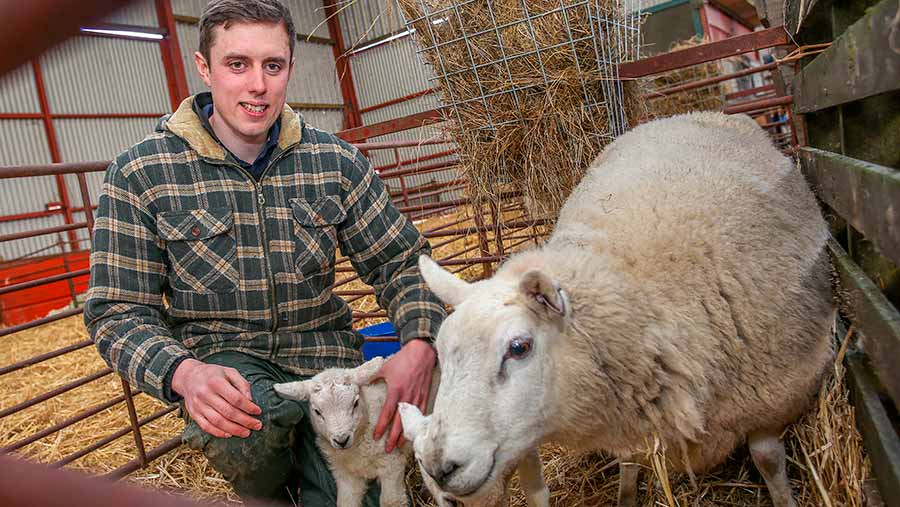Opinion: Sheep sales showcase the stock – and the drovers
 Andrew Meredith ©Richard Stanton
Andrew Meredith ©Richard Stanton Sheep sale season is upon us once more.
Apart from lambing, this is the most important time of year for shepherds – one that will entail extra days away from the farm, combining both business and pleasure.
As a farmer, I look forward to this time of year, when the annual cycle begins once more – the important business of selecting new breeding stock and witnessing the hard work many other farmers have put in to produce beautifully cared-for ewes and rams at their absolute peak of fitness.
At Welshpool Livestock Market, the most important event of the year for auctioneers, buyers, sellers and drovers is the annual Welsh Mule Sheep Breeders Association sale.
Split over two days to accommodate both ewes and lambs, it is a marathon event at which thousands of sheep will change hands.
See also: Bird in the hand approach brings farming benefits
For those two days in September, the atmosphere around the place changes.
Piles of straw fit to bury a bull replace the scattering of sawdust in the pens.
Vendors swap torn overalls for smarter attire.
Almost every sheep in the place will have been carefully hand-trimmed, had its face washed (yes really) and been unceremoniously dunked in a large vat of stinking chemical that serves no purpose other than to give it a fleece colour similar to a fake tan gone wrong.
I could happily spend the rest of this column ranting about the pointlessness of “bloom dip” but let’s just say I’m not a fan.
When you go to market as a buyer, you wander around in a bubble, frantically trying to see everything before the selling starts, then stand ringside biting your nails as the lots you’ve selected to bid on approach.
Bidding passes in a self-conscious blur as you become hyper-aware of even the tiniest movement you make that the auctioneer could interpret as an unintended signal to spend another £5 a head.
Enormous cheque
Then, exhausted as your adrenaline levels subside – and sweating at how much you’ve spent – you stumble to the payment office, write what seems to be an enormous cheque for a gamble on the ability of a pen of ewes to live and rear lambs for the next five years, then load up your stock and drive home, thinking about all the things you should have done.
So while, the next day, if I have bought well for the right money there will be satisfaction in a job well done, it is with my drover hat on that I look forward to this time of year the most.
As a drover, you have a more carefree ringside seat to witness other people having those problems.
And one of life’s greatest guilty pleasures is watching other people in uncomfortable situations.
You won’t find many drovers who will admit to loving their job. But let me tell you a little secret: we actually do.
Although we are involved with helping to unload stock at the start of the day, and putting them back on trailers at the finish, the real meat in the sandwich is, of course, taking every lot through the sale ring.
From the minute the auctioneer steps up to the microphone until the gavel falls on the last pen of the day, the objective is to avoid interrupting the flow of sheep in front of them for even a second.
Before the last bid has been taken on the previous pen, the next will be in the ring.
Delicately balanced
While the whole process looks deceptively simple, it’s not until you are involved for the first time that you realise what delicately balanced operation it is.
The young and fit are the runners – each responsible for one pen of sheep, taking them from the pen to the ring and back.
Meanwhile, those born in a different era release the correct pen, shut the correct gate as they return, help around the ring and marshall them at critical points along the route.
At any point there will be upwards of 200 sheep on the move being carefully kept in their individual lots.
The first year I was involved, I was genuinely nervous as I approached the ring with my first pen of ewes.
Not for sale
Closer and closer you get as pen after pen is sold, until the gates swing open and you are rushed into the arena. (Of course, if I had stopped and thought about it rationally, I would have remembered that no one was taking even the slightest interest in me, as I wasn’t for sale.)
Seconds later the exit opens and you are sprinting after the ewes while watching over your shoulder to make sure you don’t get lapped by the next pen.
It’s when things go wrong that life gets really interesting.
Suddenly the problem has to be rectified, while sheep rapidly begin to pile up behind you and, as if from nowhere, the foreman appears to bellow and gesture. But with a supreme effort of teamwork, it always gets sorted. It would be rare that anyone not involved would even notice.
In the middle of it all, the stars of the show of course are the wide-eyed, bewildered sheep. For them, like some of their owners, all they are longing for is the calm of home, a wide meadow and the shade of a broad sycamore tree.
So this autumn, spare a thought for the drovers on the run if you must – but don’t lose your temper if a “poor auld yow” doesn’t do what you want the first time. She’s further out of her comfort zone than you are.
